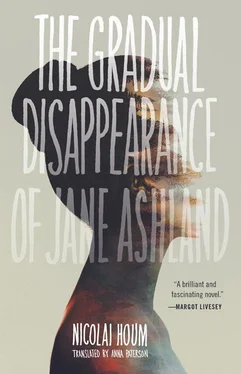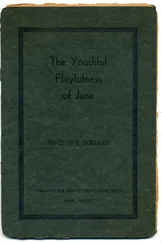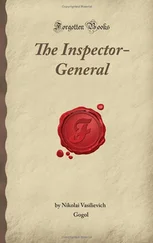She thanked him, drove on, and shouted to Julie in an old man’s cracked voice, “Under repair! Closed!”
There, she had done it again.
She suggested that they go for a walk in the open garden and the arboretum instead. Once more, Julie asked: Why? And got the answer: Why not? Julie climbed out of the car slowly and walked a few paces behind Jane across the parking lot. Jane felt that her day of sitting at her desk had left her bursting with pent-up energy. Walking along the gravel path leading to the Perennial Garden, they found themselves inside the dust stirred up by a noisy riding lawn mower. The gardens were either bleakly black or flowering desperately.
They arrived at the grassy slope where outdoor concerts were held during the summer. An empty Coke can was lying on the lawn and she could see that Julie was tempted to give it a kick. Impulsively, Jane ran to beat her to it. Julie stopped in her tracks, gave off a subdued howl, and started running. Jane had already reached the can and sent it across the grass in a fine arc. As they ran side by side to catch up with it, Jane managed to bump her hip into Julie’s side to gain ground but Julie came back with a mean leg-hook that tripped Jane up. Lying on the ground, she got hold of a sneaker that had come off and threw it after Julie, who avoided a direct hit with one graceful sideways move, picked the shoe up, and threw it among the pillars at the far end. Jane had to hobble along, shouting in annoyance. In front of her, Julie, very pleased with herself, was dribbling the can. When Jane had gotten close enough, she took aim at Julie’s thin ankles and lunged.
They both rolled around on the grass, trying to reach the can. Jane’s foot was closest but Julie lay on top of her and pushed her elbow into Jane’s thigh.
“I give up!” Jane cried.
“Loser.”
Afterward, they went to the Thai Pavilion and compared the greenish stains on their clothes. Julie eagerly went through a blow-by-blow account of the battle and Jane, who was looking at her daughter’s face, made the right noises to show that she was just as keen to relive the drama. Julie’s eyes were very wide, her nose was wrinkled, her lips moved ceaselessly. All this attracted Jane’s gaze, as did something else, both there and not there, that made her able to sense the shape of the young woman’s mind. The old saying that your child is only on loan annoyed her: Julie was her daughter and, just as irrevocably, she was Julie’s mother. No facile philosophizing could change that.
She thought she might write about the episode, turn it into a scene in a novel or perhaps a short story, but realized it wasn’t a good idea. These moments had no intrinsic structure, no problematic issue, no conflict. Only love.
While they sat there, the big lawn mower rolled past them on the cobbles below the pavilion. The man was relaxed in his seat, steering with one finger on the wheel. He got to where the path branched on either side of a statue of a lion, and, just before he might have disappeared behind the trees, he pulled a lever by his seat and swung the mower onto a grassy strip that ran parallel with the path. Jane watched with a vague sense of satisfaction as the rotating cutters created a lighter stripe in the grass. Suddenly, a squirrel leapt out of a bush and ran straight at the machine. Julie had her back turned and didn’t notice Jane’s gasp. The squirrel tried a few pointless escapes, jumping first to one side, then to the other, before it vanished under the blades. The man obviously hadn’t seen it. Jane held her breath while looking past Julie at the mower. When the squirrel emerged from underneath it, she thought at first that it had survived intact because it moved so quickly. It kept jumping up and down, as if the ground were red hot. Then she understood: the squirrel had been mutilated and the jumping was the effect of an instinctive flight response. A healthy leg kicked out and sent the body high up in the air where it somersaulted and fell back, landing on its side or its head or one of its damaged limbs. A hard-wired sequence; one could hear the processor spin.
The mower followed the curving path out of sight. The squirrel was still making its terrible leaps but had shifted sideways onto the cobbles and there was a noise each time it hit the ground. Jane faced Julie with a big, shaky grin but it was too late—Julie had already turned around to see what it was. In the short moment Julie needed to take in the strange sight, Jane had time to imagine a scenario: she had to hold the kicking, struggling squirrel in one hand while prodding it to get a grip and break its little neck as an act of mercy.
Initially, Julie shocked her by laughing.
“Look! What is it doing ?” Julie pointed.
But then, if Jane hadn’t watched the whole sequence, she would probably have been just as baffled. Could they get away so easily? With luck, maybe the animal would bounce into the bushes, leaving her alone with a memory that would make her tell herself that “nature must take its course,” repeat it in the car on the way home and in bed before she fell asleep—but what nature? The kind of nature in which squirrels are carved up by lawn mowers?
No such luck.
“Mom, it’s bleeding,” Julie cried.
Jane ran after her, past a small, concrete pond set in the space in front of the pavilion. Clouds moved swiftly across its still surface. Somehow it was as if she had never left her desk, as if she were still inside an imagined world. The closer they got to the squirrel, the more strongly she experienced its suffering as it shot up in the air and fell back, again and again. And with it, the realization that it wasn’t even smart enough to put its pain into context. She knew Julie felt more or less the same. Jane had had to accept that empathy was probably not part of the human inheritance; she and Greg had been doling it out in regular doses, like teaspoons of medicine, throughout Julie’s childhood. But by now, the medication had done its work and Julie was ready to suffer with everyone else.
“Mom, do something!”
They stopped on the edge of the large, virtual circle surrounding the convulsing squirrel, Jane holding her arms protectively in front of her body while her hands attempted to mimic sensible things to do. They both turned away, repulsed, unable to watch, then forced themselves to look, screaming in unison.
And then it was all over. The squirrel lay still, its white belly up and its front paws folded.
Jane wanted the whole thing to be over and done with as soon as possible. She would have flicked the squirrel into the bushes with a stick, but suggesting it made Julie wail. Instead, Jane had to pick it up and carry it in her hands all the way through the park. She had thought it would be like picking up a kitten, but the wrecked little creature rested on her palms like an oozing bag of skin.
On the way home, the squirrel lay on the rubber mat between Julie’s feet. The girl was beside herself. Jane had to phone Mrs. Gurzky and cancel the piano lesson.
They left the squirrel in the car to rummage in the attic for a coffin suitable for a small rodent.
“I know we have a shoe box in here somewhere,” Jane said, trying to bring some normality back into her voice.
But the search resulted in only one possibility, a flat gift box from Brooks Brothers. They would have to squash the corpse to fit it in, Jane said.
“Perhaps it should lie in the ground without a coffin? Just like other dead animals?”
“No-o!” Julie sobbed.
Jane had to remind herself that she was a grown-up and mustn’t let go and collapse, kicking and screaming, on the floorboards. In the end, she persuaded Julie that a decorative plant pot with cotton wool on the bottom would be right.
Читать дальше












